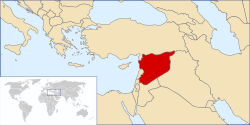
Back الجمهورية السورية الثانية Arabic Втора сирийска република Bulgarian Syrská republika Czech Syrische Republik German República de Siria (1930-1958) Spanish Siriako Errepublika (1930–1958) Basque جمهوری دوم سوریه Persian République syrienne (1930-1958) French República Siria (1930-1958) Galician הרפובליקה הסורית השנייה HE
This article needs additional citations for verification. (March 2011) |
You can help expand this article with text translated from the corresponding article in Arabic. (May 2021) Click [show] for important translation instructions.
|
Syrian Republic | |||||||||||||
|---|---|---|---|---|---|---|---|---|---|---|---|---|---|
| 1950–1963 | |||||||||||||
| Anthem: "Ḥumāt ad-Diyār" (English: "Guardians of the Homeland")[1] | |||||||||||||
 | |||||||||||||
| Status | Component of the United Arab Republic (1958–61) | ||||||||||||
| Capital | Damascus 33°30′N 36°18′E / 33.500°N 36.300°E | ||||||||||||
| Largest city | Aleppo 36°20′N 37°16′E / 36.333°N 37.267°E | ||||||||||||
| Official languages | Arabic | ||||||||||||
| Recognised languages | Syriac Armenian Kurdish | ||||||||||||
| Religion | Islam (all branches incl. Alawite) Christianity Judaism Druzism Yazidism | ||||||||||||
| Demonym(s) | Syrian | ||||||||||||
| Government | Unitary parliamentary republic (1950–1951, 1954–1958, 1961–1963) Military dictatorship (1951–1954) | ||||||||||||
| President | |||||||||||||
• 1950–1951 | Hashim al-Atassi (first) | ||||||||||||
• 1961–1963 | Nazim al-Kudsi (last) | ||||||||||||
| Vice President of Syria | |||||||||||||
• 1952–1954 | Maamun al-Kuzbari | ||||||||||||
| Prime Minister | |||||||||||||
• 1950 | Nazim al-Kudsi (first) | ||||||||||||
• 1962–1963 | Khalid al-Azm (last) | ||||||||||||
| Historical era | Cold War | ||||||||||||
• Independence of First Syrian Republic | 17 April 1946 | ||||||||||||
• New constitution adopted | 5 September 1950 | ||||||||||||
| 21 February 1958 | |||||||||||||
| 22 February 1958 | |||||||||||||
| 28 September 1961 | |||||||||||||
• Republic restored | 29 September 1961 (7:30 am) | ||||||||||||
| 8 March 1963 | |||||||||||||
| Area | |||||||||||||
• Total | 189,880 km2 (73,310 sq mi) | ||||||||||||
| Currency | Syrian pound | ||||||||||||
| ISO 3166 code | SY | ||||||||||||
| |||||||||||||
| History of Syria |
|---|
 |
| Prehistory |
| Bronze Age |
| Antiquity |
| Middle Ages |
|
| Early modern |
|
| Modern |
|
| Related articles |
| Timeline |
|
|
The Second Syrian Republic,[2][3] officially the Syrian Republic[a] from 1950 to 1958 and the Syrian Arab Republic[b] from 1961 to 1963, succeeded the First Syrian Republic that had become de facto independent in April 1946 from the French Mandate. The Second Republic was founded on the Syrian Constitution of 1950, which was suspended from 1953 to 1954 under Adib Shishakli's strongmanship, and later when Syria joined with the Republic of Egypt in forming the United Arab Republic in 1958. The Second Republic resumed when Syria withdrew from the union in 1961. In 1963, the Syrian Ba'athist Party came to power in a bloodless military coup, which laid the foundations for the political structure in Ba'athist Syria.
The green, white, black and red flag is the first flag of the Syrian Arab Republic and with the shortest usage, that being from 1961 to 1963. It was also the flag of the Syrian opposition during the Syrian civil war, and became the de facto flag of Syria anew in 2024.[4][5]
- ^ www.nationalanthems.info
- ^ George Meri Haddad (1971). Revolutions and Military Rule in the Middle East. Vol. 2. Robert Speller & Sons. p. 286. ISBN 9780831500603.
- ^ George Crews McGhee (1983). Envoy to the Middle World: Adventures in Diplomacy. Harper & Row. p. 386. ISBN 9780060390259.
- ^ "Syrian rebels raise new flag, symbolising freedom after Assad's rule comes to an end". News9live. 8 December 2024. Retrieved 8 December 2024.
- ^ Forbes Breaking News (8 December 2024). Syria’s Embassies In Turkey, Greece, And Russia Replace Ba’ath Flag With Syrian Revolution Flag. Retrieved 8 December 2024 – via YouTube.
Cite error: There are <ref group=lower-alpha> tags or {{efn}} templates on this page, but the references will not show without a {{reflist|group=lower-alpha}} template or {{notelist}} template (see the help page).

